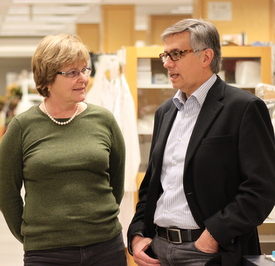The brain can still be damaged by small strokes, even if there is minimal or no physical disability apparent, according to research by Professors Claudia Jacova and Oscar Benavente.
The results of the study, part of a large international clinical trial funded by the U.S. National Institutes of Health called the Secondary Prevention of Small Subcortial Strokes (SPS3), were published in the Annals of Neurology in November.
Small strokes, also known as lacunar strokes, are actually surprisingly common, comprising 25 per cent of all ischemic strokes, and occur at a younger age than many other types of stroke. Lacunar strokes are the leading cause of vascular dementia, and are thought to result from diseases of the blood vessels, such as heart disease, hypertension, and diabetes.
Patients who were between six weeks and three months post-stroke received comprehensive neuropsychological testing including measures of memory, perceptual speed, verbal fluency, motor dexterity, and executive functions. The study included 1,663 participants from Canada and the United States who had experienced a lacunar stroke, with initial symptoms of motor, vision, and speech difficulties. Lacunar strokes are different from cortical strokes, which are often accompanied by far more dramatic symptoms, such as complete disruption of speech, voluntary movements, and awareness.
“Our results showed that about half of all participants met criteria for mild cognitive impairment, even when they had no or minimal physical disability,” said Dr. Jacova, who along with Dr. Benavente is a member of the Brain Research Centre of UBC and the Vancouver Coastal Health Research Institute. “This challenges the idea that lacunar strokes are generally thought as being fairly benign.”
This study did not assess whether the adverse cognitive effects persisted, worsened, or disappeared over time. However, the researchers will now utilize the SPS3 database to address these important questions in future studies.
“The implications for clinical practice are clear-cut,” says Dr. Benavente, who is also the research director of the Stroke and Cerebrovascular Health Program at Vancouver Coastal Health. “People who have experienced a lacunar stroke should have a cognitive assessment at the earliest opportunity, and this assessment may need to be repeated at follow-up.”
